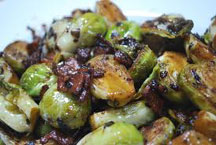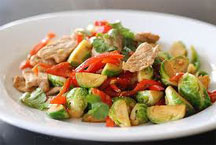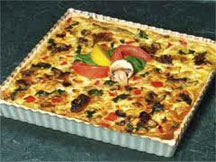SO Many Ways to Use Brussels Sprouts!
By Alice Osborne
 When you hear "Brussels sprouts" you likely think "Yuck!" before you think "Yum!" And even the most die-hard veggie eaters tend to run the other way at the site of the bitter sprouts. This is a pity, because this winter vegetable staple has SO many reasons to fall in love with it. Consider:
When you hear "Brussels sprouts" you likely think "Yuck!" before you think "Yum!" And even the most die-hard veggie eaters tend to run the other way at the site of the bitter sprouts. This is a pity, because this winter vegetable staple has SO many reasons to fall in love with it. Consider:
 They lower cholesterol because of their high fiber content. They help with fat digestion, too. So if you have digestion issues, Brussels sprouts are your veggie.
They lower cholesterol because of their high fiber content. They help with fat digestion, too. So if you have digestion issues, Brussels sprouts are your veggie.
 They block the activity of certain nasty enzymes that are detrimental to the health and stability of DNA within white blood cells.
They block the activity of certain nasty enzymes that are detrimental to the health and stability of DNA within white blood cells.
 They contain loads of powerful antioxidants - Vitamins C, E, and A, plus
the mineral manganese. Furthermore, they contain flavonoid antioxidants like isorhamnetin, quercitin, and kaempferol that protect against oxidative stress on the body's cells.
They contain loads of powerful antioxidants - Vitamins C, E, and A, plus
the mineral manganese. Furthermore, they contain flavonoid antioxidants like isorhamnetin, quercitin, and kaempferol that protect against oxidative stress on the body's cells.
 They protect against internal inflammation thanks to an abundance of glucobrassicin. Also, they contain a wealth of vitamin K that also effectively regulates the body's inflammatory responses.
They protect against internal inflammation thanks to an abundance of glucobrassicin. Also, they contain a wealth of vitamin K that also effectively regulates the body's inflammatory responses.
 Because of all of the above, they are super cancer fighters - bladder, breast, colon, lung, prostate, and ovarian, just to name a few.
Because of all of the above, they are super cancer fighters - bladder, breast, colon, lung, prostate, and ovarian, just to name a few.
 They offer cardiovascular support thanks to how effectively they help reverse blood vessel damage.
They offer cardiovascular support thanks to how effectively they help reverse blood vessel damage.
 They aid digestion and diet, prevent constipation, maintain low blood sugar, and check overeating. The sulforaphane found in Brussels spouts also protects our stomach lining by obstructing the overgrowth of Helicobacter pylori, a bacteria that can lead to gastric cancer.
They aid digestion and diet, prevent constipation, maintain low blood sugar, and check overeating. The sulforaphane found in Brussels spouts also protects our stomach lining by obstructing the overgrowth of Helicobacter pylori, a bacteria that can lead to gastric cancer.
 As mentioned, they are extra high in Vitamin K, which promotes healthy bones, prevents calcification of the body's tissues, serves as an antioxidant and anti-inflammatory agent, and is essential for proper brain and nerve function.
As mentioned, they are extra high in Vitamin K, which promotes healthy bones, prevents calcification of the body's tissues, serves as an antioxidant and anti-inflammatory agent, and is essential for proper brain and nerve function.
 Because of their high Vitamin C content, they help strengthen the immune system. They also protect against hyper tension, lower blood pressure, fight lead toxicity, combat cataracts, and serve as a powerful antioxidant that prevents "cellular rust," which can lead to atherosclerosis, heart disease, stroke and cancer.
Because of their high Vitamin C content, they help strengthen the immune system. They also protect against hyper tension, lower blood pressure, fight lead toxicity, combat cataracts, and serve as a powerful antioxidant that prevents "cellular rust," which can lead to atherosclerosis, heart disease, stroke and cancer.
 They contain high doses of Vitamin A that protects eyes against cataracts and macular degeneration, maintains healthy bones and teeth, prevents urinary stones, and is essential to our reproductive organs.
They contain high doses of Vitamin A that protects eyes against cataracts and macular degeneration, maintains healthy bones and teeth, prevents urinary stones, and is essential to our reproductive organs.
 They are loaded with folate. A biochemical event called the methylation cycle relies on folate to properly transcribe DNA, transform norepinephrine into adrenalin, as well as transform serotonin into melatonin. Furthermore, folate suppresses the amino acid homocysteine that has been shown to contribute to heart disease.
They are loaded with folate. A biochemical event called the methylation cycle relies on folate to properly transcribe DNA, transform norepinephrine into adrenalin, as well as transform serotonin into melatonin. Furthermore, folate suppresses the amino acid homocysteine that has been shown to contribute to heart disease.
 Isn't it time to give Brussels sprouts the respect they deserve? But even if we do agree, there's still the issue of the nasty taste, right? Well, if they are prepared correctly, they lose much of their off-putting flavor. And isn't that the secret to most vegetables, really? It's usually a matter of proper preparation and having a good recipe in hand.
Isn't it time to give Brussels sprouts the respect they deserve? But even if we do agree, there's still the issue of the nasty taste, right? Well, if they are prepared correctly, they lose much of their off-putting flavor. And isn't that the secret to most vegetables, really? It's usually a matter of proper preparation and having a good recipe in hand.
BUY: They should be no more than 1 inch in diameter, bright green, firm, compact, and without blemishes. They're in season from late August until March. If you're picking the sprouts out individually, make sure to get them in uniform sizes so that they will cook at the same rate.
STORE: They keep for up to 4 days in your vegetable crisper, 10 days if stored in a plastic bag. Make sure they're unwashed and untrimmed.
WASH: Any discolored or yellowed leaves should be discarded. Trim the sprouts' stems and rinse under running water.
 Now to prepare: My Aunt Annie used to roast these. Roasted Brussels sprouts are amazing and go so well with shallots and Balsamic vinegar. Wash about 2 pounds of sprouts then trim the bottoms and split them in half, removing the outer leaves. In a plastic bag, combine them with about 8 thinly sliced shallots and some extra virgin olive oil (about 1/4 cup works well). Add some sea salt and freshly ground black pepper to taste. Shake the bag until the sprouts and shallots are covered well with the oil and salt and pepper.
Now to prepare: My Aunt Annie used to roast these. Roasted Brussels sprouts are amazing and go so well with shallots and Balsamic vinegar. Wash about 2 pounds of sprouts then trim the bottoms and split them in half, removing the outer leaves. In a plastic bag, combine them with about 8 thinly sliced shallots and some extra virgin olive oil (about 1/4 cup works well). Add some sea salt and freshly ground black pepper to taste. Shake the bag until the sprouts and shallots are covered well with the oil and salt and pepper.
Preheat your oven with 2 heavy baking sheets inside. When oven reaches the temperature, spray the sheets with a cooking spray, spread sprouts and shallots evenly on the sheets and return to the oven for roasting for maybe 20 minutes, or until they are tender. Watch closely so they don't burn up. You want them charred, but tender. When they've reached the desired consistency, remove and immediately drizzle vinegar on top of sprouts. Shake to coat evenly. Serve.
 I also like to add them in to my stir-fry recipes. And sometimes I'll shred and lightly steam them and add them to my green salad along with some sunflower seeds and freshly squeezed lemon juice. Brussels sprouts also go well with sliced almonds, shredded sharp Cheddar cheese, and fresh or lightly steamed mushrooms.
I also like to add them in to my stir-fry recipes. And sometimes I'll shred and lightly steam them and add them to my green salad along with some sunflower seeds and freshly squeezed lemon juice. Brussels sprouts also go well with sliced almonds, shredded sharp Cheddar cheese, and fresh or lightly steamed mushrooms.
 And if you like making vegetable tarts or gratines, lightly shredded and steamed sprouts are perfect for this treatment. They add interesting texture and color and compliment the flavor of the other vegetables in the dish. So give Brussel sprouts a chance this winter and your health a real boost in the process.
And if you like making vegetable tarts or gratines, lightly shredded and steamed sprouts are perfect for this treatment. They add interesting texture and color and compliment the flavor of the other vegetables in the dish. So give Brussel sprouts a chance this winter and your health a real boost in the process.
Sources:
www.thedailygreen.com
www.foxy.com
www.defeatdiabetes.org
www.forthoseabouttocook.wordpress.com
www.cookthink.com
www.bakerstreat.com

